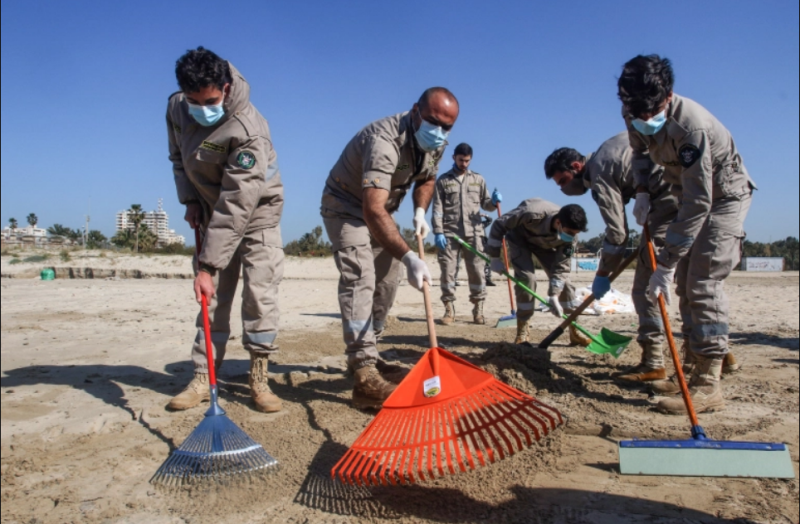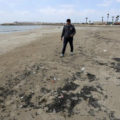Over the weekend, the Union of Tyre Municipalities, the National Council for Scientific Research (CNRS), in cooperation with volunteers, environmental and scout associations, the Civil Defense, and UNIFIL, launched a campaign to clean-up Tyre Coast Nature Reserve from balls of sticky gobs and blobs of tar, which showed up last week on South Lebanon’s beaches stretching from the border town of Naqura to the city of Tyre after washing up from an oil spill in Israel.
The heavily contaminated reserve is a Ramsar registered site that harbors many species of plants, animals, and insects. It is also a nesting site for the endangered Loggerhead and green sea Turtle, as well as a shelter to the Arabian spiny mouse and many other creatures.
Head of Tyre Municipalities Union, Hassan Dabouk, sounded the alarm on the devastating ramifications of the oil spill pollution and pointed to the grave danger it poses on Lebanon’s largest sandy beach.
“It is a popular beach visited by thousands of people on a daily basis, and this substance has massively contaminated its sand; consequently, a campaign has been launched to swiftly clean-up the tarred beaches in a bid to mitigate the damage before the start of the swimming season,” explained Dbouk, who added that work would be organized by the day to cover the entire polluted area.
Dr. Mouin Hamze, Head of the CNRS, pointed out that approximately two tons of tar had washed ashore, 90 percent of which was buried under the sand. “This is making the clean-up process even more difficult; yet, if these substances stay for a longer period, they will constitute a disaster. All our dependence is on the volunteers’ efforts to get rid of the largest amount possible of this toxic tar,” he added.
Hamze then expected the clean-up of the reserve to last for up to two more weeks, yet he had earlier anticipated tar to keep washing up on Lebanese shores for up to three months.
On another note, Hamze confirmed that thus far, there was no proof that fish wealth had been harmed in the polluted area. “There are no oil spills inside the water, therefore, no restrictions will be placed on the movement of marine fishing for now,” he said.
For its part, the “Lebanese Eco Movement” issued a statement urging the Lebanese state and relevant ministries and municipalities to investigate the cause and source of the oil spill. It demanded the issuance of “a clear report specifying the exact spots of the pollution, its size, and the amount of damage.” It also requested the allocation of a financial sum in support of affected areas.
Most importantly, the LEM pushed for a speedy clean-up process.
“The climatic factors, water currents, and tidal movements that have contributed to washing up the oil spill residues to the current sites are able to spread them further and redistribute them,” the environmental movement warned.
Youssef Jundi, Lebanon Diving Center Head, said that it was not yet known whether the source of the pollution that had contaminated Tyre coast was from ships or oil installations. He also warned that the oil spill pollution hadn’t only affected Tyre Coastal Reserve as had been reported. “The contamination has extended from Ras al-Naqoura to the beaches of al-Zahrani villages, as we have personally surveyed,” he said.
In turn, Lebanon’s Green Party said that the tar pollution along Lebanon’s southern coast required swift action at the national and international levels.
“This pollution has a serious and direct impact on the marine and beach life, which calls for quick action at the national and international levels, starting with a scientific investigation,” the Green Party said in a statement.
It called for resorting to the United Nations to implement international agreements on the Protection of the Marine Environment and the Coastal Region of the Mediterranean (Barcelona Convention). “Lebanon was one of those countries that have signed this agreement, which regulates the integrated protection of the environment and ecosystems.”
The party also ratcheted up the pressure for a radical solution to prevent the recurrence of pollution along the Lebanese coast from the remnants of industrial activities in neighboring countries.
UNIFIL spokesperson, Andrea Tenenti, said that UNIFIL had been in touch with local authorities to see what help could be provided.
“In order to ensure immediate assistance, UNIFIL has provided equipment and tools, together with additional PPEs, donated by UNIFIL ITALBATT. UNIFIL staff members have also been assisting the local communities in cleaning the shores,” Tenenti said, adding that UNIFIL troops are also cleaning the areas outside Naqoura.
UNIFIL’s Western Sector Command provided an Italian donation consisting of supplies, equipment, and preventive tools to help clean the polluted beaches of Tyre. The Italian CIMIC Office of Civil-Military Cooperation of the Western Sector has provided the first part of the required materials, to be followed by other supplies within the next few days.
Meanwhile, Lebanon’s Caretaker Prime Minister, Hassan Diab, has been following up on the matter and has officially tasked Minister of Defense, Zeina Akar, Minister of Environment, Demianos Kattar, and the National Council for Scientific Research, to follow up on the issue by informing UNIFIL forces to draw up an official report in this regard and by acting accordingly to repair the damage caused by the leakage.
Based on the PM’s decision, the UNDP Disaster Risk Management Unit (DRM) at the Presidency of the Council of Ministers has been supporting the coordination of the response operation with various ministries and agencies, as well as responding to requests based on needs.
The DRM has also activated EU mechanisms of support requesting satellite maps and images to help determine the exact scale of the oil spill’s damage.
Environmental groups in the Mediterranean region have described this oil spill a severe ecological disaster that endangers marine life and biodiversity in the area. They’ve also anticipated the clean-up process to linger for months or even years.
Rana El-Hage
National News Agency – Lebanon



